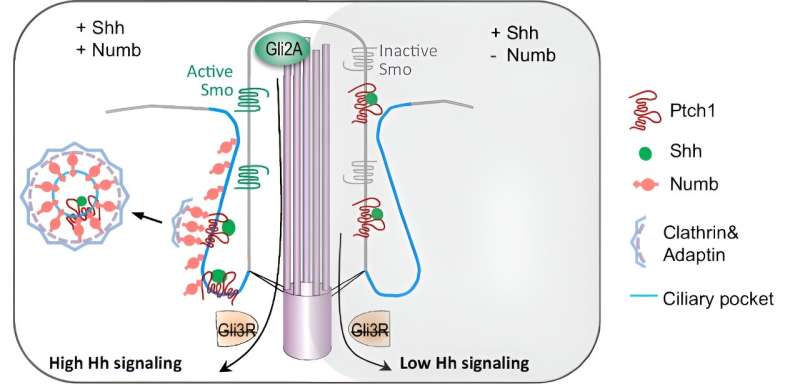This article has been reviewed according to Science X's editorial process and policies. Editors have highlighted the following attributes while ensuring the content's credibility:
fact-checked
trusted source
proofread
Study reveals protein's key role in helping cilium transmit signals to the rest of the cell

The essential role played by a protein in the functioning of cells is revealed in new work from the laboratory of Université de Montréal medical professor Frédéric Charron, holder of the Canada Research Chair in Developmental Neurobiology.
Published in Nature Communications and done jointly with researchers led by Xuecai Ge at the University of California at Merced, the study opens the door to a better understanding of the mechanisms underlying certain pathologies.
Most of the body's cells have a structure called the primary cilium, or simply, cilium. This structure acts as an antenna, responsible for detecting signals in the cell's environment. Some of these signals are responsible for stimulating cell proliferation.
In the new study, Charron identified a protein called "Numb" with his collaborators Sabrina Schlienger, Wei-Ju Chen and Vanesa Jimenez Amilburu of the molecular biology of neural development research unit of the UdeM-affiliated Montreal Clinical Research Institute (IRCM).
Numb is essential for the cilium to transmit an external signal for proliferation to the rest of the cell. Without it, the signal is detected by the cilium but its information is not transmitted to the rest of the cell, preventing its effect from taking place.
In the absence of Numb, proliferation of certain brain cells does not occur. Charron's study is important because it demonstrates a new aspect of what is required for the cilium to transmit signals to the rest of the cell.
When the transmission of the signal received by the cilium is disrupted, defects in brain development, such as cerebellar hypoplasia, can occur, as observed in mouse models studied by Charron and his team.
"Subsequent work will enable us to study this ciliary role of Numb in disease in greater detail, ultimately paving the way for new therapies," said Patricia Yam, co-first author of the study and a senior research associate at the IRCM.
More information: Xiaoliang Liu et al, Numb positively regulates Hedgehog signaling at the ciliary pocket, Nature Communications (2024). DOI: 10.1038/s41467-024-47244-1
Provided by University of Montreal




















